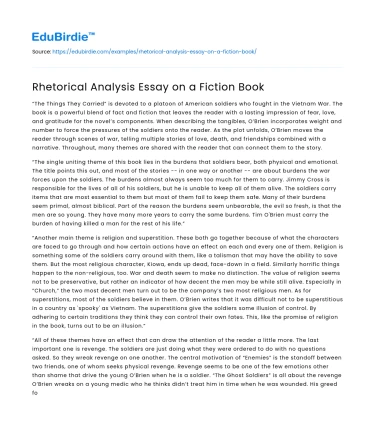“The Things They Carried” is devoted to a platoon of American soldiers who fought in the Vietnam War. The book is a powerful blend of fact and fiction that leaves the reader with a lasting impression of fear, love, and gratitude for the novel’s components. When describing the tangibles, O’Brien incorporates weight and number to force the pressures of the soldiers onto the reader. As the plot unfolds, O’Brien moves the reader through scenes of war, telling multiple stories of love, death, and friendships combined with a narrative. Throughout, many themes are shared with the reader that can connect them to the story.
“The single uniting theme of this book lies in the burdens that soldiers bear, both physical and emotional. The title points this out, and most of the stories -- in one way or another -- are about burdens the war forces upon the soldiers. The burdens almost always seem too much for them to carry. Jimmy Cross is responsible for the lives of all of his soldiers, but he is unable to keep all of them alive. The soldiers carry items that are most essential to them but most of them fail to keep them safe. Many of their burdens seem primal, almost biblical. Part of the reason the burdens seem unbearable, the evil so fresh, is that the men are so young. They have many more years to carry the same burdens. Tim O'Brien must carry the burden of having killed a man for the rest of his life.”
Save your time!
We can take care of your essay
- Proper editing and formatting
- Free revision, title page, and bibliography
- Flexible prices and money-back guarantee
“Another main theme is religion and superstition. These both go together because of what the characters are faced to go through and how certain actions have an effect on each and every one of them. Religion is something some of the soldiers carry around with them, like a talisman that may have the ability to save them. But the most religious character, Kiowa, ends up dead, face-down in a field. Similarly horrific things happen to the non-religious, too. War and death seem to make no distinction. The value of religion seems not to be preservative, but rather an indicator of how decent the men may be while still alive. Especially in “Church,” the two most decent men turn out to be the company’s two most religious men. As for superstitions, most of the soldiers believe in them. O’Brien writes that it was difficult not to be superstitious in a country as 'spooky' as Vietnam. The superstitions give the soldiers some illusion of control. By adhering to certain traditions they think they can control their own fates. This, like the promise of religion in the book, turns out to be an illusion.”
“All of these themes have an effect that can draw the attention of the reader a little more. The last important one is revenge. The soldiers are just doing what they were ordered to do with no questions asked. So they wreak revenge on one another. The central motivation of “Enemies” is the standoff between two friends, one of whom seeks physical revenge. Revenge seems to be one of the few emotions other than shame that drive the young O’Brien when he is a soldier. “The Ghost Soldiers” is all about the revenge O’Brien wreaks on a young medic who he thinks didn’t treat him in time when he was wounded. His greed for revenge is fueled by an unattractive sense of his own worth. It blinds him, distorts his morals, and makes him temporarily seem a monster in the reader’s eyes. But he does not flinch at recalling his actions, nor does he decline to tell them to the reader.”
“This essay analyzes Tim O’Brien’s “The Things They Carried.” This collection of short stories is devoted to a platoon of American soldiers who fight in the Vietnam War. In summary, the act of listening in this book is quite crucial in the sense that it provides the reader with a more profound revelation of the utterances presented by O’Brien. More so, a close following of the stories told by the author through the act of listening unveils the real nature of the scenes despite seeming like a blend of fiction and reality. On this basis, therefore, O’Brien succeeds in facilitating activeness among his audience through his use of language and various rhetorical devices to present his ideas uniquely.”






 Stuck on your essay?
Stuck on your essay?

